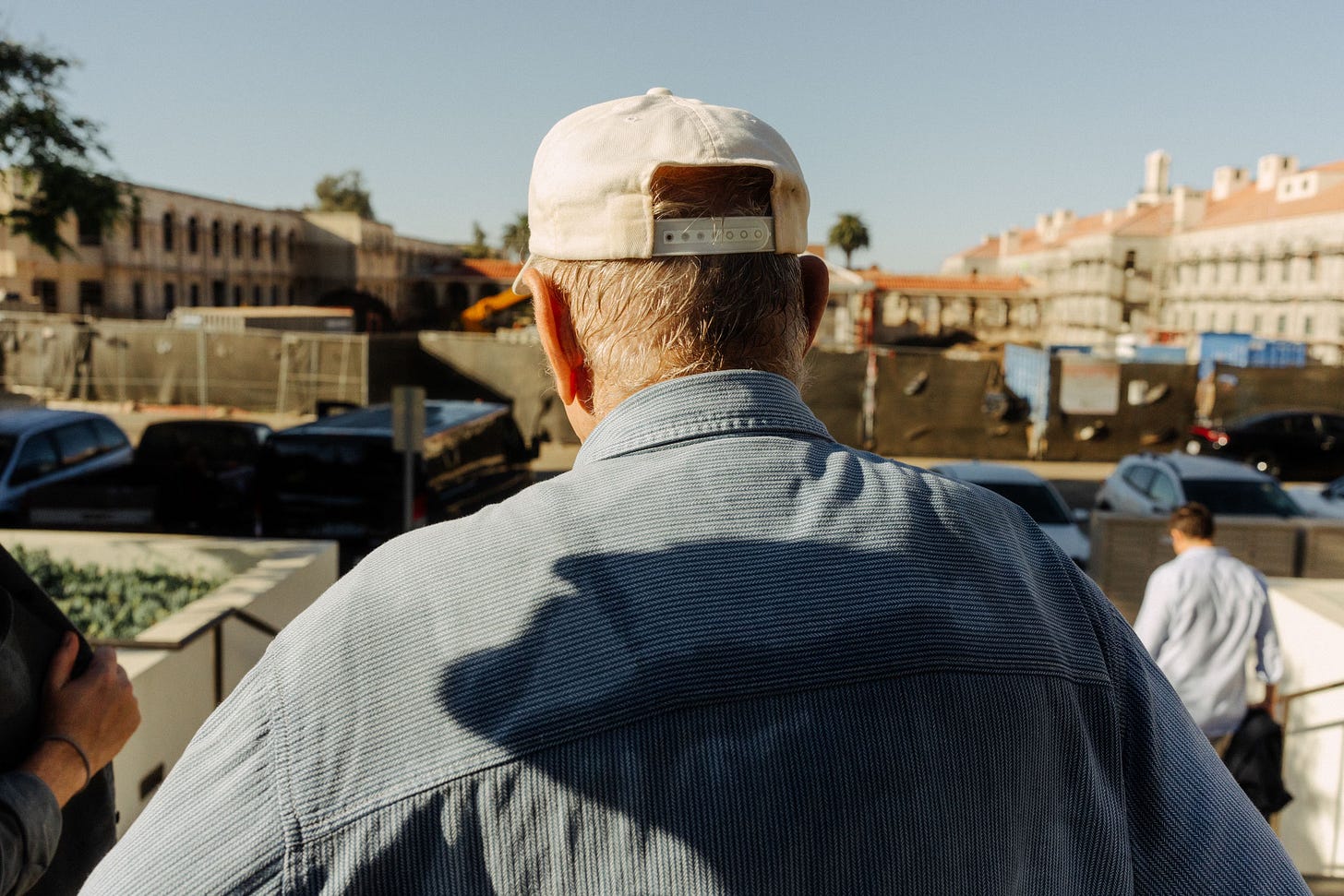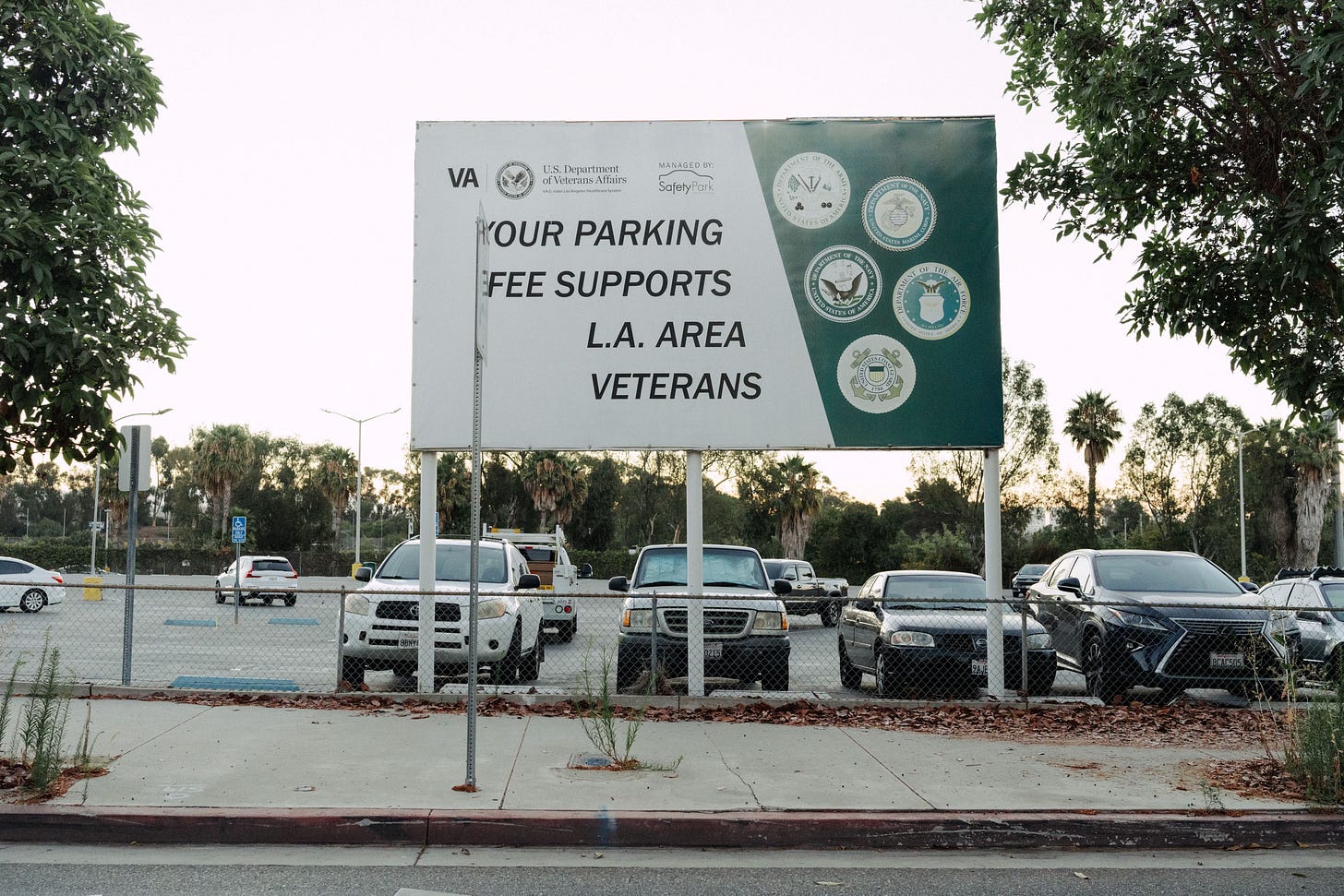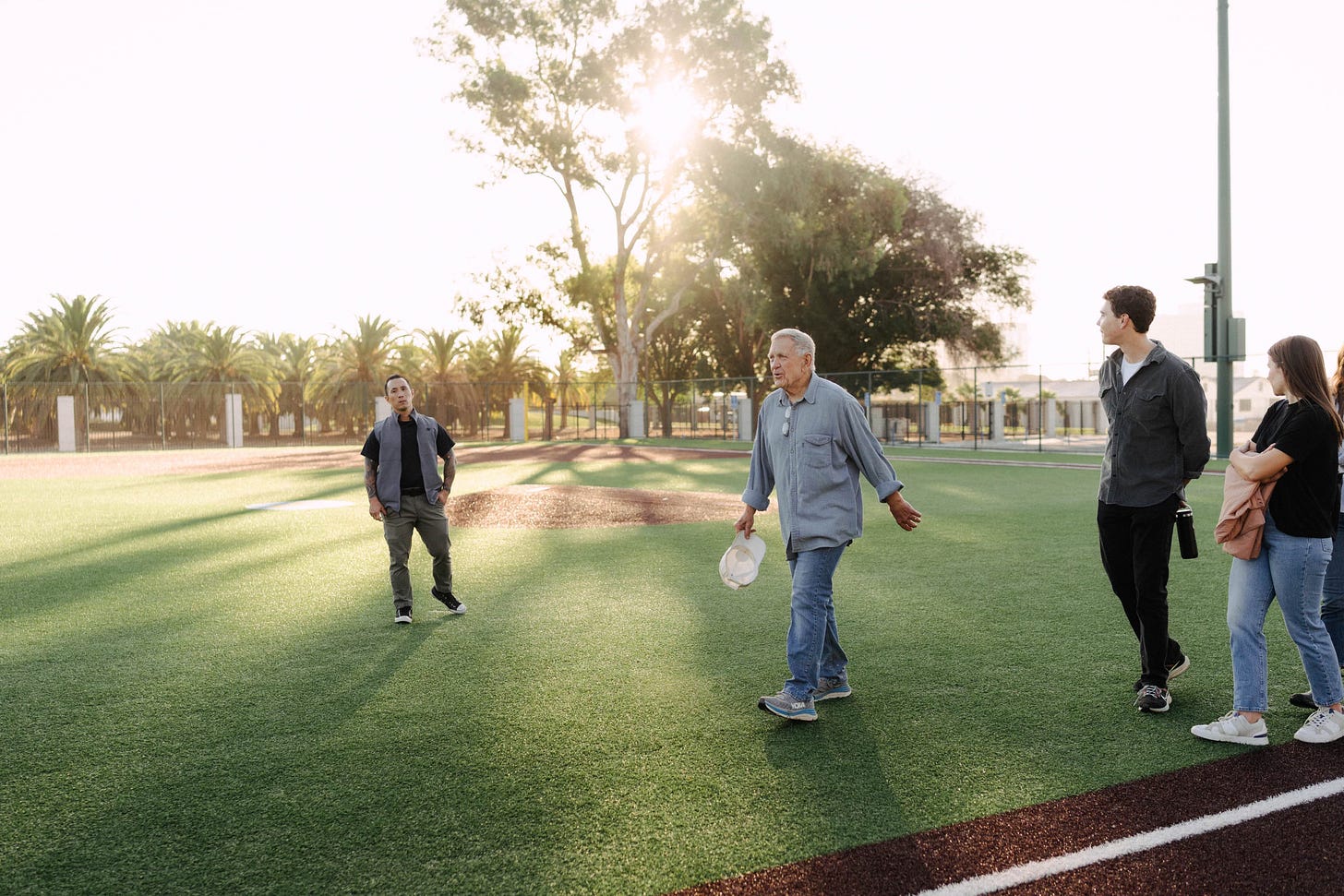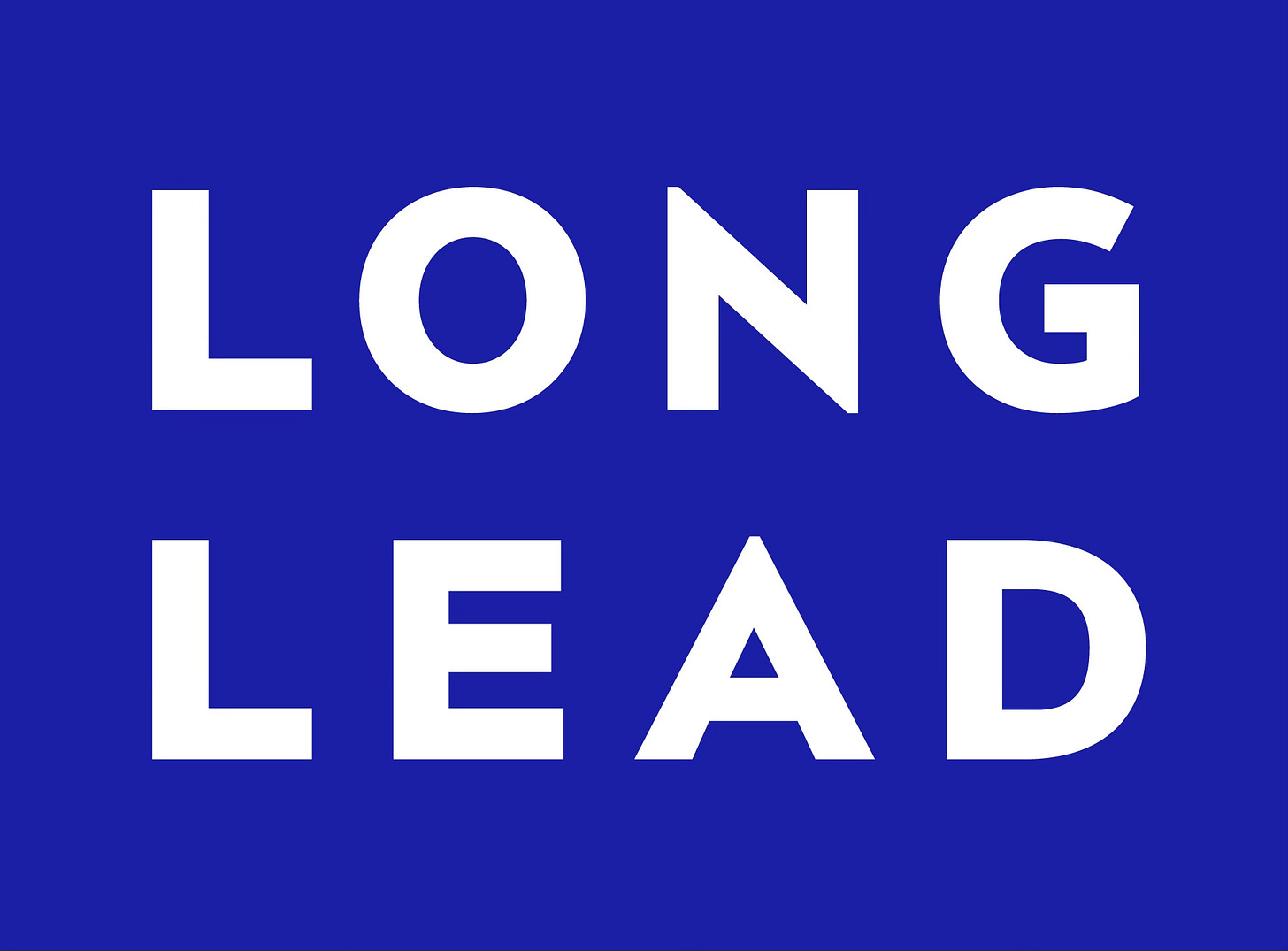Carter's opinion: "It is time for the disabled veterans of Los Angeles to come home."
“The VA must remediate its mishandling of this resource so that the land may once again be available for its intended purpose: the housing of veterans,” the judge writes.

In a fiery decision that could transform the 388-acre West LA VA campus — and the federal government’s approach to veteran homelessness — Judge David O. Carter ruled today that the Department of Veterans Affairs has breached its fiduciary duties to unhoused veterans and ordered the termination of leases with UCLA, the Brentwood School, and other organizations so thousands of new permanent housing units be built on the property.
The decision comes after a month-long trial regarding the Powers v. McDonough class-action lawsuit brought against the VA by disabled, unhoused veterans in Los Angeles.
“Over the past five decades, the West LA VA has been infected by bribery, corruption, and the influence of the powerful and their lobbyists, and enabled by a major educational institution in excluding veterans’ input about their own lands,” Carter writes. “In effect, the VA has quietly sold off these lands just as surely as granting a quitclaim deed.”
Long Lead has been reporting from Powers v. McDonough every day court has been in session, and we will continue to follow this issue in this newsletter. Subscribe here to get updates sent direct to your inbox as soon as they publish:
In the decision, Judge Carter notes the Obama, Trump, and Biden administrations each promised swift action to eradicate veteran homelessness. And each administration, since the previous 2011 lawsuit over this issue, has been warned by the VA’s Office of the Inspector General, federal courts, and veterans that it wasn’t doing enough to house LA’s veterans. “Despite these warnings, the VA has not made good on its promise to build housing for veterans,” writes Carter. “The cost of the VA’s inaction is veterans’ lives.”
In the ruling, posted to the court’s website Friday morning, the judge repeated his summary judgment that programs like HUD-VASH were discriminatory against disabled veterans as they considered disability payments as income, thereby making the vets ineligible to be housed in most units.
“Federal Defendants are enjoined from failing to provide Plaintiffs and the Class they represent with appropriate permanent supportive housing on or near the WLAVA Grounds,” Carter writes.
Carter further ordered:
750 temporary supportive housing units to be provided on the campus within 12 to 18 months of the ruling. The location of the units will be decided at a hearing scheduled for Sept. 25;
A plan for 1,800 permanent supportive housing units and “connective tissue” (like support and community services) be developed within six months of the order;
Defendants must employ “conventional financing” for its housing and that “VA can directly fund or subsidize permanent supportive housing”;
Construction to commence on the Town Center within 18 months of the order;
Case workers to be staffed at “an appropriate level” to provide up to 25 HUD-VASH referrals per week to housing agencies, reduce attrition, in housing and increase outreach efforts; and
The appointment of a monitor to oversee the implementation of the housing orders.
Throughout the opinion, Carter lambasted the VA’s treatment of unhoused veterans and its failings.
“The VA argues they are out of space, and that the lack of available acreage precludes any increase to the 1,200 units they have promised to open on the West LA campus by 2030,” Carter writes.
“The problem, however, is one of the VA’s own making,” he adds. “The VA must remediate its mishandling of this resource so that the land may once again be available for its intended purpose: the housing of veterans.”
The ruling does not just demand that the VA build housing for veterans; in a move sure to be the subject of several legal challenges, Carter wrests control of land currently occupied by the Brentwood School and UCLA back into the hands of the VA.
Get the whole story: An epic government scandal hiding in plain sight
Home of the Brave is a multi-part, multimedia series exploring the unhoused veteran crisis at the West LA VA campus, a 388-acre property that was deeded to the U.S. government to provide veterans housing. Over the last 50 years, that land has been carved up and leased to private interests, while development for veteran housing has been painfully slow.
This newsletter reports how veterans are fighting to reclaim the land in a class-action lawsuit against the Department of Veterans Affairs. The feature tells the rest of the story — a land grab dating back to the U.S. Civil War, bursting with government malfeasance, neglect, graft, and even death. Read it today.
Carter also found that the federal defendants (the VA and HUD) “have breached and continue to breach their fiduciary duties… by allowing (the VA Greater Los Angeles) to use the (West Los Angeles) Grounds for purposes that are not directly related to providing housing, community, and healthcare for veterans with disabilities.”
The ruling prohibits the VA “from executing and maintaining any land use agreement, including those identified by this Order, that does not principally benefit veterans and their families.”
Specifically, the judgment takes aim at leases the VA currently has with organizations like UCLA, the Brentwood School, and the Bridgeland oil company, for parcels of the campus.
UCLA’s lease was for just over 10 acres on which the Jackie Robinson baseball stadium and practice field sits, while the Brentwood School had a lease for 22 acres, upon which it built a multi-million dollar athletic complex. Hearings on the “exit strategies” for those leases will be discussed at a Sept. 25 hearing regarding injunctive relief.
“The VA has not made good on its promise to build housing for veterans. Instead, it has continued leasing portions of the West Los Angeles campus to a private school, UCLA’s baseball team, an oil company, and other private interests. The cost of the VA’s inaction is veterans’ lives. The cost of the VA’s inaction is veterans’ lives.” — Judge David O. Carter
In the 125-page judgment, Carter recounts the history and background surrounding the veterans’ long standing dispute with the VA over housing, including outlining the history of the West LA VA grounds, the “misplaced” trust in the VA by the court in the Valentini lawsuit, the subsequent Master Plans, and the eventual unhoused veterans crisis that amassed at the VA’s own gates.
“The VA did not sanction Veterans’ Row and did not see those veterans as their responsibility,” Carter writes, noting “living on the sidewalk endangered the residents of Veterans Row and worsened their mental and physical conditions. At least one resident of Veterans Row was stabbed to death.”
Outlining the plaintiff’s legal claims, Carter notes that the unhoused, disabled veterans seek permanent supportive housing so that they can avoid being “institutionalized or placed at risk of institutionalization,” which testimony showed is an acute risk to people under stress while living on the street. The plaintiffs also sought to have it determined whether the VA had breached its fiduciary duty to the charitable trust that was formed when it received the donation of the now-West LA VA land, which Carter has ruled it has. Lastly, the plaintiffs sought relief under the Administrative Procedure Act (APA) over the Brentwood School, Bridgeland, and UCLA land deals entered into by the VA, which Carter agrees do not “principally benefit veterans and their families.”
The judgment’s more than 50 pages of discussion explores the various claims brought up throughout the trial, including the quality of VA’s care, temporary and permanent housing, its use of the HUD-VASH voucher system that has proved problematic for veterans. “The record established at trial… demonstrates that… veterans with serious mental illness and traumatic brain injuries require Permanent Supportive Housing,” writes Carter. The VA’s failure to provide that housing places unhoused veterans at risk of institutionalization, further depriving them of access to their healthcare benefits, he notes. Specifically, he points to testimony of Joseph Fields:
“[I]t seemed like we’d fall into this cycle of, you know, going to jail, getting out of jail, going to the sidewalk, going back to jail, going to VA program, getting kicked out, going back to the block, going back to jail, going back to a VA program. That was a never- ending cycle for a decade for me. There was nothing for us to go to.”
While Carter does point to the recent success of the VA in housing disabled veterans, he dismisses long-standing claims by the department that it lacks authority to directly fund permanent supportive housing, itself. This ruling could end the conflict that funding permanent supportive housing through HUD-backed financing has caused: Veterans who receive high levels of disability compensation can then be deemed ineligible for housing, due to having too much income. (The federal government proposed a policy change on this at the start of the trial, but the conflict would remain because the policy would not affect state or local regulations.)
Carter ends a lengthy examination of the arguments presented by the defense with a line reminiscent of something VA administrator John Kuhn told Long Lead prior to the trial. “Permanent supportive housing is a form of healthcare,” writes the judge.
Home of the Brave is produced by Long Lead, an award-winning story studio dedicated to finding, financing, producing, and publishing original, in-depth journalism. From photo essays to podcasts and every medium in between, our features have been honored by organizations as varied as the Society of Professional Journalists and the Webby Awards. The American Journalism Online Awards called our work “most likely to inspire future journalists.”
Though the trial is over, we continue our reporting. For more on Long Lead’s award-winning journalism, subscribe to the Long Lead newsletter here:
In examining the legality of four land-use agreements (by Brentwood School, Safety Park, Bridgeland Oil, and UCLA), Carter notes, “The Court holds that each of the challenged land-use agreements are in violation of the Leasing Act, and therefore are a breach of the VA’s fiduciary duty.”
In recounting Brentwood School’s history with the VA, Carter writes “Given the size of the investment that the Brentwood School put into its facilities, it must have had some understanding with the VA that it would be a permanent occupant of the land, notwithstanding its time-limited lease. The VA essentially acquiesced in a quiet sell-off of the land.” He further notes, “the permanence” of its three baseball fields, stadium field track, pool, and tennis court build on the VA land “is a tangible representation of the school and the VA’s expectation that these lease renewals would lead to perpetual ownership.”
Carter’s analysis of Brentwood’s use of the land notes “minimal services, such as limited hours of access to athletic facilities and a few volunteer drives, do not transform a lease for student athletic facilities into one that principally benefits veterans.”

Nodding to the “sordid history” of the parking lots leased by the VA, Carter calls the department’s conclusion that its Safety Park lease is lawful flat out wrong. “Safety Park operates two parking lots, both of which are along Barrington Avenue and adjacent to the nearby Brentwood Village business district,” Carter writes. “The parking lots, because of their location, primarily benefit the Brentwood merchants and their patrons, not veterans and their families.” He calls the services that Safety Park provides to its veterans “minimal,” and notes that the company has not even been providing them.
Carter points out that Dr. Keith Braverman testified that the parking lot is “an area that could be suitable for housing in the future if that was necessary.”
“The decision to lease land to a parking lot that could be used to house a homeless veteran is flat-out inconsistent with the VA’s fiduciary duty to use the West LA VA Grounds in a manner that benefits veterans,” Carter writes.
Turning to the VA’s lease with Bridgeland, an oil company that drills on the West LA VA property, Carter also finds that the lease does not principally benefit veterans or their families, and is therefore terminated. The history recounted in Carter’s decision is interesting, outlining the roughly 70-year relationship with the oil and gas producer that even saw it illegally slant-drilling under the VA grounds without an active lease — and then being rewarded with a new agreement. In return for the drilling rights, Bridgeland provided a 2.5 percent royalty to the Los Angeles Chapter of Disabled American Veterans, which was required to use the money to provide transportation to vets on and around the West LA VA.
“The decision to lease land to a parking lot that could be used to house a homeless veteran is flat-out inconsistent with the VA’s fiduciary duty to use the West LA VA Grounds in a manner that benefits veterans.” — Judge David Carter
“The fact that Bridgeland pays a royalty to a private charity to provide transportation highlights the pernicious effects of the VA’s practice of leasing land to third parties,” writes Carter. “Part of the reason why the charity must provide transportation to and from the West LA VA Grounds is that so few veterans live on the campus.” Veterans are better served by housing than a drilling license, he adds in invalidating the lease.
The last lease Carter invalidates is for the land underneath UCLA’s Jackie Robinson Stadium and its Branca Family Field, a practice space next to the ballpark. In his examination of the agreement, Carter recounts the contents of a whistleblower tape of VA administrator Robert McKenrick discussing VA’s practice of “leasing off land behind veterans’ backs, (while) the residents of Veteran’s Row, including several of the plaintiffs in this lawsuit, were sleeping in tents outside the front gates of the West LA VA. (Listen the tape here, at 7:04.)
Carter explores the value of UCLA’s lease payments, noting the VA’s Office of Inspector General “was unable to determine if VA received fair value for use of the WLA campus.” He also examines the in-kind services offered by UCLA as a part of the agreement, calling them “questionable.”
In examining the legality of the UCLA lease, Carter looks briefly at the value of the rent — and notes that it was appraised to be worth $2.7 million in 2015. But UCLA only pays $300,000 annually, in addition to $1.35 million in in-kind services each year. Those services include free tickets and refreshments for veterans at its baseball games, but Carter notes, “UCLA acknowledged that for most of the games, there are hundreds of empty seats in the stadium.”
“Even assuming the in-kind services were correctly valued,” Carter writes, “the fact remains that the leased land is predominantly, and almost exclusively, used for UCLA’s baseball program.”

In addition to invalidating the leases, Carter is prohibiting the VA from entering into new leases with these parties, specifically citing “VA’s persistent mismanagement” of the West LA VA. “Following the Valentini decision that voided the leases for the Brentwood School and the parking lot (as well as eleven other leases) the VA executed new leases with the school and the Safety Park,” he notes.
“The Court holds that it is virtually impossible for leases for a private school’s athletic facilities, a parking lot near Brentwood businesses, an oil drilling operation, and a UCLA baseball stadium to principally benefit veterans,” Carter writes. “Accordingly, Federal Defendants are hereby enjoined from entering into new land use agreements with the Brentwood School, Safety Park, Bridgeland Resources, and UCLA.”
In conclusion, Carter ends his decision where the West LA VA began: Abraham Lincoln’s words in the aftermath of the Civil War, when plans for the federal government to house veterans were first formed. “[L]et us strive on to finish the work we are in, to bind up the nation’s wounds, to care for him who shall have borne the battle and for his widow, and his orphan, to do all which may achieve and cherish a just and lasting peace among ourselves and with all nations,” said Lincoln.
To it, Carter adds this coda: “What was once a home for disabled soldiers must fully reopen its gates and become a robust community for veterans once again. It is time for the VA’s leadership at the highest levels to recognize its obligation and mission statement to care for those who have borne the battle. It is time for the disabled veterans of Los Angeles to come home.”
An injunctive relief hearing for Powers v. McDonough is scheduled for Wednesday, September 25.
A Uniquely American Problem: Gun Violence
Season three of Long Lead’s Murrow Award-winning podcast “Long Shadow” examines the uniquely American problem of gun violence and how, over decades, a carefully manufactured fear has driven explosive demand for firearms across the U.S.
Hosted by Pulitzer-finalist historian and journalist Garrett M. Graff, produced in collaboration with The Trace, and distributed by PRX, this season of “Long Shadow” helps listeners understand how 21st-century America, clad in both camouflage and Kevlar, has become both a bastion of freedom and a land of lockdowns. How did we get here — and can we ever find a way out?
Listen and subscribe wherever you get your podcasts, and learn more at www.longshadowpodcast.com.













As pointed out by DOJ/VA in the most recent pleading they filled, on August 30,, 2024, by entering into 3 land leases to apartment developers under the EUL program, VA subjected itself and its land lessee/apartment developers to a law enacted by Congress 38 U.S.C. 8166, which provides as follows:
"§8166. Construction standards
The construction, alteration, repair, remodeling, or improvement of a property that is the subject of an enhanced-use lease shall be carried out so as to comply with all applicable provisions of Federal, State, and local law relating to land use, building standards, permits, and inspections."
That opened a Pandora's Box of problems for the V.A. and any Special Master appointed by Judge Carter, because the V.A is now subject to the jurisdiction of:
Los Angeles County Public Works Department for grading and building permits for the veterans housing;
Los Angeles County Public Health Department as deputized agent of the State of California's landfill Regulatory agency CalRecycle, because an old toxic and radioactive substance containing landfill is on the VA property, next to apartment building sites, because the State of California has enacted a massive set of detailed laws and regulations about landfills, with the West LA VA Landfill existing since the late 1940's just south of where at trial Judge Carter has said he wants 600 more permanent apartments built next to/north of the landfill;
California Regional Water Quality Control Board - LA which regulates the leaking of toxic and radioactive substances from old landills into underground water, especially if a plume of toxic and radioactive underground water goes off-site from the VA North Campus;
South Coast Air Quality Management District - Another California state agency which gains jurisdiction when a real estate developers activities "moving dirt" cause toxic or radioactive substances to be emitted into the air during construction activities stirring up contaminated dirt and dust.
The VA's goal, when it adopted the 2022 Master Plan for the North Campus was to leave the West LA VA Landfill alone, not clean-out the toxic and radioactive substances and liquids in it and ignore it.
It looks like that VA plan to "llay low" is not going to work her, given Federal law, I.e.38 U.S.C. 8166, requiring the VA to comply with State and local law any Special Master appointed by Judge Carter as well as VA officials, are about to discover the hornets nest the judge and the plaintiffs have disturbed, in the form of 2 state agencies and 1 county agancy "deputized" by the state and having no discretion to "invent" loopholes or exceptions in state law having to do with landfills, especially those with toxic and radioactive substances in them. Naturally occurring Methane gas from the soil*, as well as from the decomposition of the "waste" in the landfill, such as thousands of animal carcases, which were the subject of radionuclide-using medical experiments, decomposing and producing methane, will prove to be the least of the problems building veterans housing on the West LA VA North Campus.
And then there's the VA's 2014 written agreement with the Nuclear Regulatory Commission which provides that the VA won't build anything on top of the landfill, or any part of it, without the Nuclear Regulatory Commission's approval. That agreement exists because of the radioactive waste in the West LA VA Landfill.
* California's State laws about controlling methane near places of human habitation first arose from the naturally occurring explosion of methane which in 1986 had seeped into"Ross Dress for Less" on 3rd St. at Fairfax. Few older Angelenos can forget the cracks in the sidewalks from the block where Ross Dress For Less was located flaming for several days. Look for photos from old news stories on the internet to see how the store building was demolished due to the naturally occurring methane gas explosions. After that explosion the State had soil gas testing done to find the neighborhoods in LA whose soil and soil gas created the risk of explosion. The West LA VA Campus is right at the western edge of that explosive soil gas zone. As a result the one hack employee-expert from the VA, saying "There's no gas in the soil" is NOT going to get the VA or its land lessees, present or future, out of complying with County and State law about methane monitoring regardless of whether the soil is naturally methane filled, or whether methane is being created by the decomposing remains of puppies, kiddies and bunnies who died in medical experiments and were buried in the West LA VA Landfill.